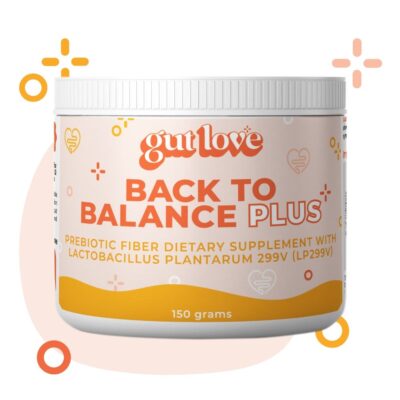Does Crohn’s Disease cause hair loss? Let’s dive in.
Living with Crohn’s Disease can be a challenging journey, with a range of symptoms impacting the daily lives of those affected.
Most commonly known for causing severe gastrointestinal issues like diarrhea, pain, and inflammation, Crohn’s can also lead to complications beyond the digestive system.
Questions about hair loss come up often in our practice. While symptoms alone can be hard to manage, the physical changes we can experience with IBD can be hard for many in that it is a visual reminder of the hardships of IBD.
Hair loss is common with people with IBD, especially during flare up’s when the chance of malnutrition can increase significantly.
Treating IBD with nutrition and medications alongside your gastroenterologist can help increase the chance that the autoimmune condition will go into remission. Let’s delve into the connection between Crohn’s and hair loss, exploring potential causes and preventive measures.
Does Crohn’s Disease Cause Hair Loss?
To better understand the possible link between Crohn’s Disease and hair loss, it is crucial to first gain a clear understanding of what Crohn’s Disease is and how it affects the body.
What Is Crohn’s Disease
Crohn’s Disease is a type of inflammatory bowel disease (IBD) that causes chronic inflammation in the gastrointestinal tract. It can affect any part of the digestive system, from the mouth to the anus, but most commonly impacts the small intestine and the beginning of the large intestine. The inflammation can lead to various symptoms, including abdominal pain, diarrhea, weight loss, and fatigue.
Is Hair Loss A Common Symptom of Crohn’s Disease
Although hair loss is not a direct symptom of Crohn’s Disease, a substantial percentage of people living with the condition have reported experiencing hair loss at some point during their journey.
Research suggests that hair loss can be attributed to a combination of factors, such as stress, medication side effects, and nutritional deficiencies.
Common reasons we often see for hair loss with IBD:
- Rapid weight loss, skipping meals and malnutrition
- Nutrient deficiencies like iron, zinc, or protein
- Low thyroid hormone due to weight loss or underlying condition
How Can Crohn’s Disease Cause Hair Loss
There are several ways in which Crohn’s Disease can contribute to hair loss:
Malnutrition
Crohn’s Disease often impairs the body’s ability to absorb essential nutrients, or may utilize more nutrients tha leading to malnutrition. Nutritional deficiencies, especially in iron, zinc, folate, vitamin C and vitamin D, can result in hair loss or thinning.
Proper nutritional management is crucial for individuals with Crohn’s to ensure their bodies receive the necessary vitamins and minerals for optimal health.
Medication Side Effects
Certain medications prescribed to manage Crohn’s Disease, such as corticosteroids and immunomodulators, may cause hair loss as a side effect.
Reported hair loss may be directly related to the medication, or may also be related by certain nutrients decrease by the medication.
If you suspect your hair loss is medication-related, consult your healthcare provider for guidance on this.
Emotional and Physical Stress
Living with a chronic illness like Crohn’s can lead to significant emotional and physical stress, which may trigger a condition called telogen effluvium.
This type of hair loss occurs when the normal hair growth cycle is disrupted, causing hair follicles to enter a prolonged resting phase and resulting in increased hair shedding.
How to Prevent Hair Loss From Crohn’s Disease
While hair loss related to Crohn’s Disease may not be entirely preventable, there are several strategies you can implement to promote hair health and reduce the risk of hair loss:
Ensure Proper Nutrition
Collaborate with a dietitian with extensive IBD experience (like us) to make sure you are getting your baseline needs met. We can help you all the things that can stand in the way of getting enough nourishment like nausea, gut symptoms and low appetite.
Hair loss can often be an indicator that we need to look at ensuring there is enough protein and calories present overall. It can also indicate mineral deficiencies like iron and zinc.
People online often reference biotin when it comes to all types of hair loss including alopecia areata. Although biotin is an important nutrient and it is involved in keratin production, our gut bacteria actually make this!
Nourishing your gut bacteria with prebiotic rich foods can help naturally support biotin and other B vitamin production. Plus, in the case of IBD, this can also help support what’s going on in the gut too.
Although Biotin often gets all the attention, it’s important not to neglect checking, iron, zinc and protein first. Rather than focusing on single nutrients, a well absorbed multivitamin that’s 3rd party tested would be our first pick.
Manage Stress
Engaging in stress management techniques such as meditation, deep breathing, or yoga can help mitigate emotional and physical stress, reducing the risk of hair loss.
Apps like the Nerva app can also be helpful for helping you cope better.
If you are malnourished and dealing with multiple nutrient deficiencies, skipping meals or are at risk for not meeting your bodies daily needs – consider working with us.
Malnourishment isn’t uncommon with IBD but it can stand in the way of remission, can increase symptoms and can actually decrease your ability to cope with stress ³.
Consult Your Healthcare Provider
Regularly discuss your hair loss concerns with your healthcare provider, who may recommend blood tests to check for nutritional deficiencies or refer you to a dermatologist for further evaluation and guidance.
In conclusion, while Crohn’s Disease may not directly cause hair loss, its symptoms and associated factors can contribute and lead to both hair thinning or loss.
Is your hair loss a sign of malnutrition?
While many with IBD experience hair loss, we would encourage you to get a malnutrition assessment with us by scheduling a consult. Assessing for things like iron deficiency, zinc deficiency and checking for physical signs of malnutrition can help you not just with hair loss but also with helping you respond to medications better ².
Maintaining open communication with your healthcare team, optimizing nutrition, and managing stress are essential components of promoting overall well-being and reducing the risk of hair loss for individuals living with Crohn’s Disease.
We invite you to Work with Us
Are you experiencing weight loss, hair thinning, nutritional deficiency or gut symptoms? Are you struggling to eat normally or skipping meals to avoid triggering symptoms?
These can all be signs that you are malnourished which can impact your ability to get to remission. We would love to help you get an effective plan in place to turn things around. Check out how you can work with us HERE. Check out our home page for videos of past patients and case reports.
References:
¹ American Dietetic Association. Position of the American Dietetic Association: Nutrition intervention in the treatment of anorexia nervosa, bulimia nervosa, and other eating disorders. J Am Diet Assoc. 2006 Dec;106(12):2073-82. doi: 10.1016/j.jada.2006.09.007. PMID: 17186637.
² Balestrieri P, Ribolsi M, Guarino MPL, Emerenziani S, Altomare A, Cicala M. Nutritional Aspects in Inflammatory Bowel Diseases. Nutrients. 2020 Jan 31;12(2):372. doi: 10.3390/nu12020372. PMID: 32023881; PMCID: PMC7071234.
³ Tian QB, Chen SJ, Xiao LJ, Xie JQ, Zhao HB, Zhang X. Potential effects of nutrition-induced alteration of gut microbiota on inflammatory bowel disease: A review. J Dig Dis. 2024 Feb;25(2):78-90. doi: 10.1111/1751-2980.13256. Epub 2024 Mar 7. PMID: 38450936.
Other articles & podcasts:
Is Crohn’s Disease a disability?







0 Comments
Trackbacks/Pingbacks